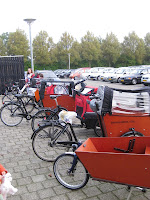Unlike my European friends who speak two or three languages fluently, much of my practical education in foreign language came from watching American television in the 1970’s. I can thank “Miss Piggy” for my 10 words of French, and I can thank “Sergeant Schultz” from Hogan’s Heros for my 5 words of German. Limited though my German vocabulary may be, last week I was determined to use all five words during my trip to the Black Forest.
Germany, what a large country! Good thing it’s legal to drive as fast as your little car will take you. Walt LOVES to drive there, go figure. I found that driving was a white knuckle experience along those “autobahn” highways. I love to go fast and all, but if I were going 100 mph, the cars flying up behind me and flashing their high beams were going an easy 140. At one point I had to painfully pry my hands out of their death grip on the steering wheel. It was time to find a slower lane.
Despite our speed, it seemed to take forever to get to our little farm in the Black Forest. Maybe this was because I was once again traveling with small children. Audrey is going through a phase (ok, I hope it’s a phase) where she finds out how to annoy a person and then makes a sport out of it. Her victim this trip was Jordan. Poor thing.

The farm we called home for the week was a lovely place. Nestled in the foothills of the Alps, up a long winding one-lane road, sits the most picturesque little dairy farm. God bless Gisela, the farm’s co-owner. In addition to milking the twenty cows twice each day, she also manages four guest houses, offers breakfast daily, and bakes all of her own bread for the week in an ancient wood burning oven. Oh, and she makes her own jam. 
The farm was in a great location and offered a cozy and relaxed place for the kids to explore. The barn kitties were such a huge hit that I’m lucky I didn’t find one in a suitcase when we got home. Audrey and Jack both learned how to milk a cow. Jordan decided kitties were safer than cows. Lord knows, they smell better.
Gisela’s father would come to the barn each night at milking time to regale each of us with his stories of the old days. He was born on this very farm in the 1930’s and had no doubt seen a world of change from pre-Nazi Germany to the present day. I would have loved to sit him down and hear about his experiences; he was dying to tell me. But as I speak only English, and he spoke only German, we were both stuck. I did try to impress him with my dazzling German linguistics, but there is only so far that five words will take you.
Our first morning out, we hiked to the Cloister Ruins at Allerheiligen by way of the Allerheiligen Waterfall. The one kilometer hike started below in the valley and followed the small river through the forest to the top of the mountain . It was easy to imagine the fairytales of the Black Forest as we climbed the damp and mossy trail along the falling water. Snow White, Hansel and Gretel, or Red Riding Hood could have been just past the next turn in the path.
The Cloister Ruins were dramatic. A full half of a church still stands. Built at the end of the 12th century, it was struck by lightning and destroyed in 1804. Jack was amusing himself standing in a large stone trough-like thing on the cloister floor. I smiled and asked him what he thought this was. He guessed, “a watering trough for horses?” He jumped about a mile when I told him it was a sarcophagus. Ewwww.
Everywhere we went, I continued to drop my little gem stones of German. I’d smile and offer a passing stranger a bright and merry “Gutentag”. I was so Continental! I was so sophisticated! They would respond with some mysterious pleasantries, and I would nod knowingly.
I’m hopeless. I remind myself of the young men and women on the streets of Beijing that would cross the street just to greet me with a friendly, “Hello!”; this being their one and only word of English.
Maybe it’s ok to be an unsophisticated American speaking only English with my broad flat “A’s”. I think it is more important to try, to reach out, to make eye contact, and attempt politeness no matter what the language. Bridging the gap between an American mom on holiday and an elderly farmer from the foothills of the Alps may be as simple as a smile and a nod. To be open to the world and accepting of any experiences it might bring me, this is a lesson that transcends language. It is the reason I travel. And maybe, just maybe, it is a gift I might bring to my children.













